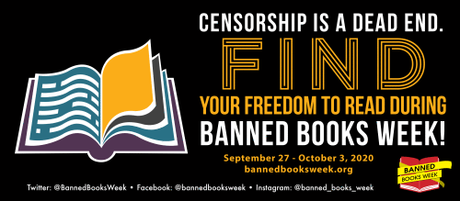The censor-morons are loose, and they’re attacking the small targets so their totalitarian masters can expend their energy on big ones like the internet. – “The Return of the Censor”
Censorship, once condemned by all ethical people, has now become almost universally popular. From the most totalitarian of governments down to the youngest of adults, it seems everybody without a functional moral compass (which is to say, the great majority) wants to impose their ideas of “right” thinking and “correct” speech on everyone else. China, of course, is leading the way, with a new Maoist-type campaign to purge schools and libraries of books deemed insufficiently pure, but the West isn’t far behind. In the UK, cops are knocking on doors to intimidate people who made statements online that the cops didn’t like, and early this month a woman in Melbourne was actually arrested for posting on Facebook about a protest against totalitarian “lockdown” orders imposed by the Victorian government. In the US, the pandemic is only one of many popular excuses for censorship; others include “hate speech”, criticizing the police, and (for social media platforms) either engaging in censorship on their own or not censoring often enough for the tastes of censors. I know that last is confusing, so let me state it a different way: Some politicians and other control freaks want to censor Facebook, Twitter, et al for engaging in censorship themselves, while others want to censor the same entities for not censoring enough. Yes, it’s complete lunacy, and it isn’t limited to the internet; culture warriors in academia, Hollywood, and even corporate America are firing,expelling, or otherwise ostracizing people for engaging in wrongthink, or even for failing to chant approved party slogans with sufficient enthusiasm.
When I was a librarian, Banned Books Week was little more than an academic exercise; censorship was an intermittent and generally impotent threat proceeding from small numbers of narrow-minded busybodies, which was easily defeated by librarians and other guardians of our shared cultural heritage. But that was a generation ago, and would-be censors have become numerous, aggressive, well-organized and (most concerningly) popular. Few of those under 30 even understand what free speech is or why it’s important, and the majority or those over that age imagine all sorts of exceptions that they believe should be reasons to violently suppress speech, ranging from “it hurt my feelings”, to “it was said or written by a dead person who did things considered normal then, but which are now mortal sins”, to “it contains ‘bad’ words”, to the ever-popular “But SEX!” As I wrote last year, the censor-morons (a term coined by D.H. Lawrence, one of many writers now considered “problematic”) are loose; furthermore, they are multiplying like bacteria and have already infested all the centers of power. For now, the courts are mostly still defending the rights of those with enough money, resources, and patience to fight “cancellation” through official channels. But if you will take the time to read all of my essays for this occasion starting in 2012, and working your way up a year at a time to the present, I think you’ll see a very frightening trend. We are watching the advent of a new dark age, and in such times no light is entirely safe from being snuffed out by zealots, speech-cops and bureaucrats whose ideal model for human society is the anthill.
